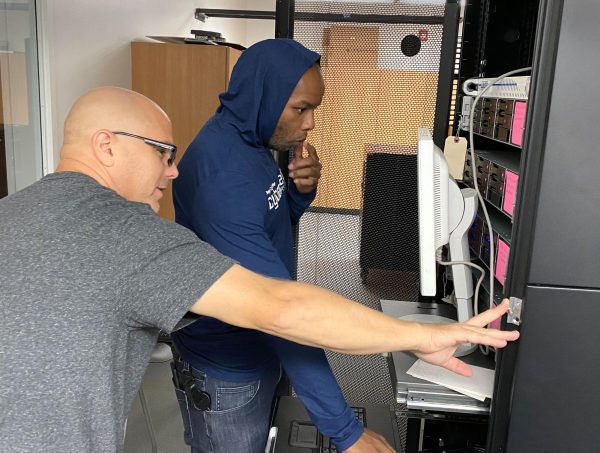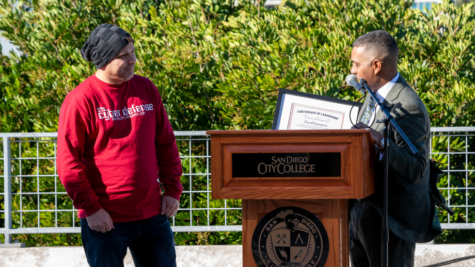City College submits proposal for bachelor’s in Cyber Defense and Analysis
While AB-927 allows for fifteen proposed bachelor’s degrees to be approved per submission period, only ten proposals were submitted statewide
More from The Knowledge Industry
Design by Philip Salata/City Times Media
This piece is part of an ongoing series regarding the passing of AB-927, which opens the door to more bachelor’s programs at California community colleges. Each year up to 30 proposed degrees will be approved. The following showcases San Diego City College’s first proposed program.
At the helm of San Diego City College’s cybersecurity program is Professor David Kennemer, a quick-thinking pedagogue acutely aware of how the market for his field is moving both locally and globally.
Kennemer grew up in Louisiana in the 1970s and 1980s in a household he said often didn’t have power or water. So when his mother signed him up for the military at 17, he recognized she was guiding him toward one way to make a better life for himself.
Which is exactly what Kennemer did.
“And when I hear my students' stories, sometimes I think I had it pretty good,” he said.
Because of his experiences, Kennemer is passionate about improving students’ access to higher education, and just as importantly, well-paid employment.

Kennemer is an advocate for developing bachelor's degrees at community colleges, especially as he sees his students succeed and land jobs but hit a barrier in their progress to higher positions. Often a bachelor’s degree is the key that opens further avenues.
And for this reason – and also the potential for a CSU or UC to swiftly create a program that would block the path toward potential accreditation – Kennemer’s proposed Cyber Defense and Analysis program was selected as the first candidate from City College to apply to establish a bachelor’s degree.
In a military town like San Diego, information technology is a booming industry.
Naval Information Warfare Systems Command (NAVWAR) and Qualcomm are among the leading employers, and there are many opportunities for aspiring professionals to develop high-paying careers.
According to a 2019 report produced by the Cyber Center of Excellence, a local non-profit created to address regional planning needs for the cybersecurity workforce, San Diego boasts a $3.5 billion industry.

“We’ve got Amazon here, we’ve got Apple here,” Kennemer said. “We’ve got all the Big Tech companies here in our region.”
According to the report, the greater San Diego area provides over 12,400 direct jobs in cyber with another 24,350 jobs related to or impacted by the cyber market.
And more importantly, the market is still growing.
This is especially relevant given one stipulation of AB-927 is that newly developed degrees fill existing workforce gaps.
According to the CCOE report there are approximately three open positions for every qualified cyber worker in the San Diego region.
But, another report underwritten by the information technology consulting firm Booz Allen Hamilton and created in collaboration with the CCOE, highlights the need to increase student accessibility to this industry.
“San Diego colleges and universities, along with industry leaders, will need to work to break down the barriers preventing more students from engaging more heavily in Cyber and (artificial intelligence) degree programs,” the report read.
According to Kennemer, the cyber program at City College provides that accessibility.
His students range from military vets to working professionals seeking industry certification. But the program is designed to equip a student of any experience level with the needed foundations to effectively be able to work in the field upon completion.
Even with out-of-state tuition being considerably higher, students cross state lines in search of an affordable cyber education. Some even cross the U.S. border from Mexico to advance their careers or do coursework remotely from all over the world.
“It's really incredible hearing their stories,” Kennemer said, “and getting everyone in the class a global perspective on how (information technology) is approached in different areas of the world.”
As it stands the program spans, “pretty much everything in cybersecurity from offensive security to the defensive side,” Kennemer said.
But in order to meet AB-927’s non-duplication stipulation – which restricts community colleges from establishing bachelor’s degrees in majors already present at UCs and CSUs – Kennemer said the focus of the proposed bachelor’s degree would have to be narrowed to what is currently most needed, cyber defense.
Because of the world’s increasing systems connectivity the need to defend those systems from threats of compromises is also increasing, with implications both locally and internationally.
“We’re going to focus on critical infrastructure and supply chain,” Kennemer said, “and all this emerging technology, and focus on the defensive side, and how you can actively defend in real-time.”
With such skills students can quickly secure a number of entry-level jobs ranging from computer specialist to a junior systems administrator, and within a year or two, they could potentially be making at least $60,000 a year.
But perhaps more important for Kennemer is how a bachelor’s program at a community college can be inherently more accessible.
“We take all comers, right? You just come in and we will help you,” Kennemer said.
In the process of reporting on AB-927, CTM reached out to student journalists at other community colleges that submitted a proposal during the first biannual submission period. Here are the stories produced by other California community college campuses:
• Moorpark College awaits approval to develop a bachelor’s degree in biomanufacturing - Shahbano Raza, News and Government Desk Editor, Moorpark College Reporter
• Students await Mt. SAC’s first baccalaureate program - Joshua Sanchez, Editor-in-Chief, SAC.Media
Unlike the UCs or CSUs, there are fewer restrictions at a community college for an interested individual to become a student.
And a bachelor’s in cyber would connect students with a viable career at a considerably lower cost than a UC or CSU. AB-927 mandates that bachelor’s degrees created at community colleges cost around $10,000 for all four years of instruction.
Having been deployed to Afghanistan as a satellite communications and networking technician, City cyber student David Colón has experienced firsthand the importance of having skilled professionals in the field.
But, as Colón has returned to school to pursue an education, he’s had to juggle commitments to work and family.
“City College provides that flexibility and opportunity to pursue my education at the most affordable price,” Colon said.
Now that the proposal has been submitted, all Kennemer and City College can do is wait to see if it will be accepted. They expect to hear back by May 31.
And Kennemer is cautiously optimistic.
“We've got a program description, we've got outcomes, we've already put the skeleton in place, if you will,” Kennemer said. “We've done our fieldwork in terms of job opportunities.”
At the Feb. 15 City College Council meeting, Rose LaMuraglia, dean of City’s school of business, information technology, cosmetology and engineering expressed relief that the proposal had finally been submitted.
“The amount of work involved in doing these proposals is huge,” LaMuraglia said.
City College’s cybersecurity program proposal dates all the way back to 2014, when the state’s community college pilot program was originally launched.
But back then, it was passed up in favor of Mesa College’s Health Information Technology bachelor’s program, which was selected and has been awarding degrees since 2018.
LaMuraglia, however, expressed confidence that this time things may be different.
“One thing that is to our advantage this time is that from Region X, (Cyber) is the only program proposing,” LaMuraglia said. “Everyone else decided to wait.”
Community college Region X includes all colleges from the San Diego Community College District, Grossmont-Cuyamaca Community College District, and Imperial Valley, Southwestern, Palomar and MiraCosta colleges.
In fact, only 10 colleges statewide submitted applications, five less than the 15 that can be approved in this application period, according to the California Community Colleges Chancellor’s Office.
One possible reason for the lack of proposals was the application period. Faculty were notified over winter break when many were away from work, and the window only lasted a month. Proposals were due by Jan. 15, and Kennemer said he was first notified on Dec. 19.
“There will be a rebuttal to this from the UC and the CSU,” he said. “They certainly objected to all of the pilot programs (established under SB 850, the precursor to Ab-927).”
City College President Ricky Shabazz said that due to those rebuttals, even he had been skeptical of pursuing a cyber-related proposal, and had initially hoped to talk Kennemer out of submitting the application.
But Shabazz assured that, despite his initial skepticism, Kennemer had convinced him and the proposed Cyber Defense and Analysis program had his full support.
‘David has done a wonderful job … carving out a niche within cybersecurity that warrants us offering a bachelor’s,” Shabazz said.
Kennemer acknowledged that there are a wide variety of cyber-related programs available, ranging from boot camps to certificates to concentrations.
But after a thorough review Kennemer and his team “strongly” felt that their proposed program was unique.
Still, questions remain in terms of the potential rewriting of the California Master Plan for Higher Education, the framework that delineates the roles of the state’s public institutions of higher education.
Shabazz, for example, advocated for allowing community colleges to develop bachelor’s degrees in nursing, another industry that has a high demand for educated professionals and a limited workforce due to impaction at nursing programs.
With AB-927, community colleges are forced to look to the local labor market for clues as to which program may be a successful candidate, rather than building curriculum based on social needs.
Administrators must leave out the potential for providing liberal arts education or access to some bachelor’s degrees that would guarantee higher pay to a wider demographic of students.
Even when those degrees – as is the case with nursing – may be just what the labor market is asking for.
Your donation will support the student journalists of San Diego City College. Your contribution will allow us to purchase equipment, cover the cost of training and travel to conferences, and fund student scholarships. Credit card donations are not tax deductible. Instead, those donations must be made by check. Please contact adviser Nicole Vargas for more information at nvargas@sdccd.edu.

Jakob McWhinney found his passion for journalism when he returned to school in fall 2020, after losing both of his jobs at the beginning of the COVID-19...

Philip Salata joined City Times Media in fall 2021. His interests include urban geography, borderlands, culture, sustainability and social justice.
After...









